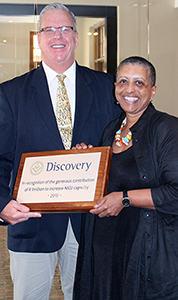Latest News Archive
Please select Category, Year, and then Month to display items
14 November 2024
|
Story André Damons
|
Photo André Damons
 Staff members from the Directorate Research Development (DRD) at the University of the Free State; Palesa Mgaga, second from right, Tebogo Machethe, centre, and Charelise van Staden, second from right, were thanked for hosting the launch of the Khoebo Innovation Promotion Programme. They are pictured with colleagues from the IDC’s Samkelisiwe Mtsewu, left, and Thato Mogopodi, far right.
Staff members from the Directorate Research Development (DRD) at the University of the Free State; Palesa Mgaga, second from right, Tebogo Machethe, centre, and Charelise van Staden, second from right, were thanked for hosting the launch of the Khoebo Innovation Promotion Programme. They are pictured with colleagues from the IDC’s Samkelisiwe Mtsewu, left, and Thato Mogopodi, far right.
The University of the Free State (UFS), represented by the Directorate Research Development (DRD), played host to the Department of Trade Industry and Competition (dtic) and the Industrial Development Corporation (IDC) for the launch of its Khoebo Innovation Promotion Programme (KIPP).
The launch took place on 5 November in the Sasol Library on the Bloemfontein Campus. Tebogo Machethe, Director: Research Contracts and Innovation at the DRD, said its role was to expose the university researchers to different opportunities and programmes for funding from the IDC and the dtic. It also allowed the researchers to engage potential funders in order to understand what funders look for in a project when considering funding it.
“The aim of IDC KIPP is to assist local entrepreneurs and small to medium enterprises with commercialisation funding. The KIPP offers capital and business support to SMMEs during the early stages of commercialisation with particular emphasis on township and rural entrepreneurs,” said Machethe.
Address uneven distribution of economic development
KIPP is a dtic programme but is managed by the IDC and aims to enable early-stage innovative SMEs to penetrate the market with their locally developed innovations, resulting in a more competitive economic environment and thereby facilitating economic growth in the economy.
According to Machethe, who welcomed the guests, participants and presenters to the launch, some of the funding is geared towards the development of university innovations. Though the focus was on the KIPP launch, he continued, the discussions also encompassed other forms of funding that are available and more geared towards the university innovation.
His address was centred around the university's Vision 130 and how it supports innovation and the entire innovation ecosystem, which seeks to shift the emphasis to research impact, embracing both knowledge and societal impact. Vision 130 identifies the need for a greater focus on collaborative research, research that can attract large-scale funding in niche areas where the university is seen as a national and global leader.
Samkelisiwe Mtsewu, KIPP Account Manager at the IDC, said the programme was introduced to address the uneven distribution of economic development across the country. She said with its capacity, the KIPP programme can contribute to addressing the uneven distribution of economic development.
Neonatal Care Unit receives donation to expand capacity
2015-10-28
 With the best care and technology available,
the survival rate of premature
babies is about 85%. The neonatal intensive
care unit at the Universitas hospital can now
expand its capacity thanks to a donation of
R1 million by the Discovery fund.
From the left is Prof André Venter.
Head: Department of Paediatrics and
Child Health at the UFS, and mrs Ruth Lewin,
Head: Corporate Sustainability at Discovery.
|
The smallest people need the greatest care. This care is being provided by the neonatal unit in the Children’s Wing of the Universitas Hospital. This project of the University of the Free State (UFS), under the leadership of Prof Andre Venter, has led to several miracles regarding child health since its inception.
Now, thanks to a donation of R1 million rand from the Discovery fund, this unit can expand its capacity and treat more premature babies.
About 14% of babies in South Africa are born before the 37th week of pregnancy. These babies are born with a very low birth weight, and are in need of critical care. The neonatal intensive-care unit at Universitas Hospital is currently equipped to take care of about 14 premature babies at a time, from birth to discharge. However, because of the high incidence of premature births in the hospital’s service area, the unit needs about 45 beds.
The aim of the Children’s Wing Project is to expand the neonatal intensive-care unit in order to meet the demands of the hospital’s service area, which reaches as far as the Southern Cape. The Discovery Fund recently donated R1 million to the project, which will be used to expand the capacity of the neonatal intensive-care unit.
“With the best care and technology available, the survival rate of premature babies is about 85%. Without this, half of all premature babies would die,” says Prof Venter, Head: Department of Paediatrics and Child Health at the UFS.
“This is the reason why private and public partnerships, such as the one with Discovery, are essential to make specialised services available to the most vulnerable people. Discovery has made a significant contribution to the project without which we would not have been able to expand the capacity of the unit